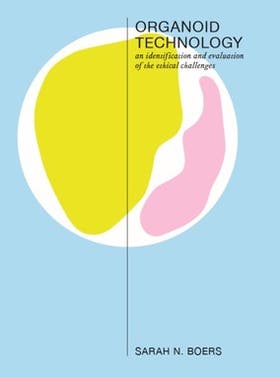Sarah Boers
Organoid technology: An identification and evaluation of the ethical challenges

- Datum
- (Co) promotoren
- 16-05-2019
- prof.dr. A.L. Bredenoord, prof.dr. J.J.M. van Delden
Samenvatting
Recent advances in the stem cell field make it possible to culture three-dimensional human tissues in a dish called organoids. These organoids have promising scientific and clinical applications that range from disease modelling to (personalized) drug development and organoid transplantation. Storage of organoids in living biobanks enables long-term, international, academic and commercial distribution and use. These promises are paired with ethical challenges. In the thesis entitled ‘Organoid technology: an identification and evaluation of the ethical challenges’, Sarah Boers pro-actively examines the ethical challenges associated with organoid technology in four parts. Part I sets the ethical research agenda through mapping four clusters of challenges that require pro-active scrutiny, namely: the moral and legal status of organoids, consent, biobank governance, and responsible clinical translation. In Part II Boers examines the moral status of organoids, in Part II she formulates conditions for the exchange of organoids and related human tissue products, and Part IV evaluates the ethical challenges related to the clinical translation of organoids in first-in-human organoid trials. Here follows a short summary of the most important findings. Regarding the moral status of organoids, in Part II Boers proposes to recognize organoids as hybrids that ambiguously relate to persons and their bodies as well as to technologies and markets. Organoids are grown from human tissue samples and they represent the donors and their bodies, identity and values. Simultaneously, organoids are (bio)technological instruments that bear commercial value. These different values can conflict. The challenge lies in enabling (partial) commercialization of organoids to stimulate biomedical innovation, while respecting the values and interests of donors and society. Part III contends that current ethical conditions and safeguards for the exchange of human tissues (or human tissue banking and research), i.e. donor consent, anonymization of tissue samples, and the non-commercialization principle, are inapt to meet this challenge. Alternatively, Boers proposes a ‘consent for governance model’ as leading paradigm for the exchange of organoids and related human tissue products. In this model the ethical emphasis shifts from initial donor consent to ongoing governance obligations, including privacy by design, participant engagement, benefit sharing, and ethical oversight. In Part IV Boers argues that the inclusion of children in a first-in-human live organoid trial is only justified if direct benefits can be reasonably expected, provided that other conditions for responsible research with children are met. Furthermore, Boers proposes a novel approach to evaluate risks and benefits in first-in-human trials in which estimates of efficacy based on animal studies and reference class evidence are integrated into the assessment. This thesis contributes to morally responsible innovation, not only in organoid technology, but also in the broader biotechnological field where sophisticated human tissue products are exchanged in an increasingly complex global market.
